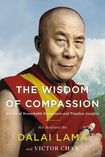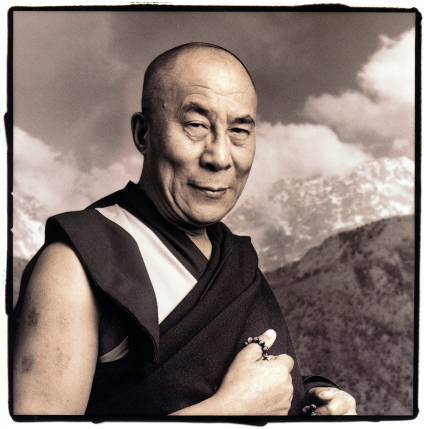
The Wisdom of Compassion offers rare insights into the Dalai Lama’s life and his efforts to translate compassion into action through deeply engaging, behind-the-scene stories about his interactions with remarkable people from all walks of life. This is the Dalai Lama at his most human, and most humane. We see how he approaches the world with playfulness, optimism, and a profound empathy for the suffering of others. Through his own conduct, he shows us the tangible benefits of practicing kindness, forgiveness and compassion. And he demonstrates that opening our hearts and minds to others is the surest path to true happiness. The Wisdom of Compassion is an intensely personal portrait of the Dalai Lama. It recounts the story of his friendship with a blind Irishman, how they first met and how in later meetings the Dalai Lama comes to call him his one and only hero. It explores the Dalai Lama’s collaboration with a neuroscientist and how it results in significant discoveries about the human brain. It also brings to life poignant accounts of his uncommon encounters with a little beggar girl, a disabled boy in a critical care ward, a man who trains grandmothers to become solar engineers, and many others. The Dalai Lama’s wisdom principles revolve around the practical application of compassion. Enhanced by his seven decades of practice and elucidated through captivating anecdotes of his own experiences, they will help readers lead more fulfilling lives. As the Dalai Lama has written many years ago: if you want others to be happy, practice compassion; if you want yourself to be happy, practice compassion.
Author

Jetsun Jamphel Ngawang Lobsang Yeshe Tenzin Gyatso (born Lhamo Döndrub), the 14th Dalai Lama, is a practicing member of the Gelug School of Tibetan Buddhism and is influential as a Nobel Peace Prize laureate, the world's most famous Buddhist monk, and the leader of the exiled Tibetan government in India. Tenzin Gyatso was the fifth of sixteen children born to a farming family. He was proclaimed the tulku (an Enlightened lama who has consciously decided to take rebirth) of the 13th Dalai Lama at the age of two. On 17 November 1950, at the age of 15, he was enthroned as Tibet's ruler. Thus he became Tibet's most important political ruler just one month after the People's Republic of China's invasion of Tibet on 7 October 1950. In 1954, he went to Beijing to attempt peace talks with Mao Zedong and other leaders of the PRC. These talks ultimately failed. After a failed uprising and the collapse of the Tibetan resistance movement in 1959, the Dalai Lama left for India, where he was active in establishing the Central Tibetan Administration (the Tibetan Government in Exile) and in seeking to preserve Tibetan culture and education among the thousands of refugees who accompanied him. Tenzin Gyatso is a charismatic figure and noted public speaker. This Dalai Lama is the first to travel to the West. There, he has helped to spread Buddhism and to promote the concepts of universal responsibility, secular ethics, and religious harmony. He was awarded the Nobel Peace Prize in 1989, honorary Canadian citizenship in 2006, and the United States Congressional Gold Medal on 17 October 2007.